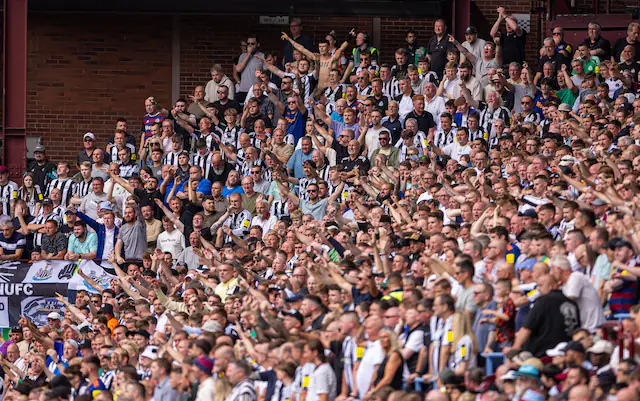Aston Villa and Newcastle fans united in song, attacking the Premier League’s Profit and Sustainability Rules.
- Steve Basing
- Aug 23
- 4 min read
Getty Images/Jacques Feeney
The beginning of the Premier League season is usually accompanied by excitement. The sun is still shining, new signings are being unveiled, and for most fans, no matter how long-suffering, hope suddenly springs, if not eternal, then at least temporarily.
But instead of premiering a new chant for a new player, when Aston Villa and Newcastle met at Villa Park on the opening day of the season, the rival fans were united in song, aiming for the Premier League’s Profit and Sustainability Rules (PSR).
Put simply, the Premier League’s PSR is designed to prevent clubs from overspending and putting their very existence at risk. Over a rolling three-year period, clubs must limit their losses to no more than £105 million.
To the minds of Aston Villa and Newcastle fans, as well as many others, the rules are simply designed to entrench the so-called ‘Big 6’ in their position of financial superiority. This feeling is felt by much of the league, but perhaps most acutely at Villa and Newcastle, two teams who in recent years have flirted with breaking into the upper echelons of English football.
Newcastle and Villa fans argue that the ‘Big 6’ owe their position to previous heavy spending, in the case of Manchester City and Chelsea, this amounts to relatively recent massive spending bankrolled by wealthy benefactors, and in the case of Manchester United, Liverpool, Arsenal (and to a lesser-extent) Tottenham, the result of historical and contemporary success and their positions as massive global brands.
The consensus amongst many fans is that PSR prevents their club from spending in a way that would allow them to close the gap on these clubs and muscle into the nation’s elite. Essentially, PSR pulls up the ladder, leaving the haves and the top and the have-nots at the bottom.
The anger at the PSR rules was brought to a head at Villa Park by what the Villa faithful believe was the forced sale of Jacob Ramsey, a Villa youth prospect, for £40 million. The sale helped Villa stay within the PSR rules, particularly given that as a player who emerged from Villa’s Youth Academy, the full £40 million sale price was profit.

Getty Images
Of course, Villa and Newcastle fans raise very valid points. PSR is a flawed system, somewhat of a blunt instrument for dealing with what is a genuinely legitimate problem. Without some sort of constraint, history tells us that reckless spending puts the very future of football clubs in jeopardy. Just ask Leeds United or Portsmouth fans. However, with its focus on profit, as opposed to total spending, it does little to level the playing field in the league, rather serving to give a financial edge to the traditionally most profitable clubs.
This becomes particularly difficult for fans of clubs like Villa and Newcastle to accept when they watch Manchester United, a club that finished well into the bottom half of the league and has no European football for the upcoming season, be able to spend a vast fortune rebuilding their team. Their financial advantage is not coming as a result of their on-field success (at least not in recent years) but rather due to their historical position as a global superclub.
However, those Villa and Newcastle fans railing against PSR last weekend missed a key part of the story for both their clubs.
In the case of Aston Villa, whilst PSR has indeed stopped them from investing heavily this summer, this hasn’t always been the case. As the club has sought to reestablish itself in the Premier League, following relegation to the Championship in 2016, they have spent a significant sum of money.
Last season, Villa’s wage-to-revenue ratio was a reported 96%, and given their failure to achieve Champions League football for the coming season, it was clear they would need to sell players. Villa’s pursuit of short-term success was a risky bet and one that seems to have not succeeded, leaving the club more a victim of their own reckless strategy than PSR.
Likewise, the great black-and-white Toon Army of Newcastle were being slightly disingenuous in their criticism of PSR. Newcastle’s situation is slightly different from Villa’s. In 2021, Newcastle found itself being the latest English Football club to be acquired by mega-wealthy owners, having been controversially purchased by the Saudi Arabian Public Investment Fund.
Newcastle’s gripe with PSR is that, given the limitless resources of their owners, it is unfair that they are not allowed to spend like drunk sailors in the way Sheik Mansour and Roman Abramovich did at Manchester City and Chelsea, respectively. Whilst this argument is true, it does create something of a paradoxical position for Newcastle fans.
Newcastle fans are annoyed that they aren’t allowed to use their financial power to muscle into English football’s elite; however, they simultaneously view it as unfair that City and Chelsea have used their financial wealth to do just that. Essentially, PSR is preventing Newcastle from doing the very thing they are complaining that other clubs did – buying success and a seat at the top table. This leaves Newcastle fans in the rather hypercritical position of having to simultaneously defend and criticise such vast spending by clubs.
PSR is flawed and is full of unintended consequences, not least the shifting of young players around the league to allow clubs to offset their purchases. However, clubs cannot blame all their ills on it. More often than not, the clubs forced to sell for financial reasons need to do so due to their own short-sightedness or recklessness.
A revolution in football finances is required, but the custodians of the game shouldn’t be taking any morality, or financial, for that matter, lessons from Aston Villa and Newcastle United.




![[Original size] DJ's Sports Show.png](https://static.wixstatic.com/media/75856f_7f4ffe7f83c14d209a701ef21c02c17d~mv2.png/v1/fill/w_120,h_120,al_c,q_85,usm_0.66_1.00_0.01,enc_avif,quality_auto/%5BOriginal%20size%5D%20DJ's%20Sports%20Show.png)





Comments